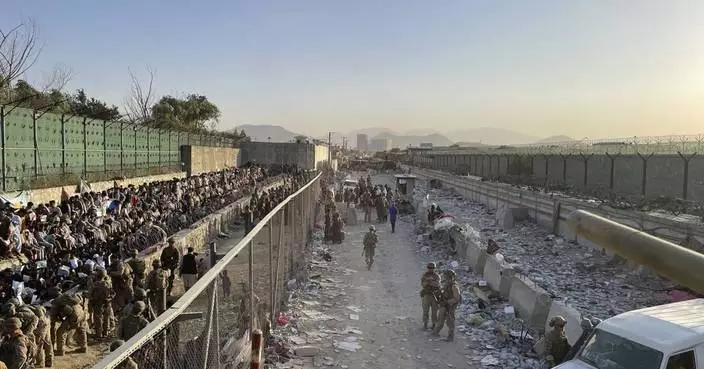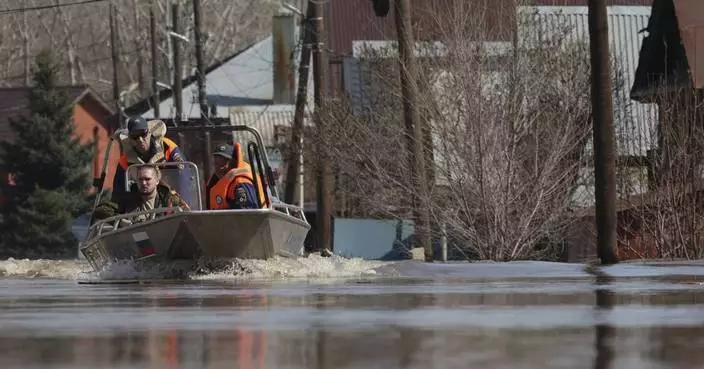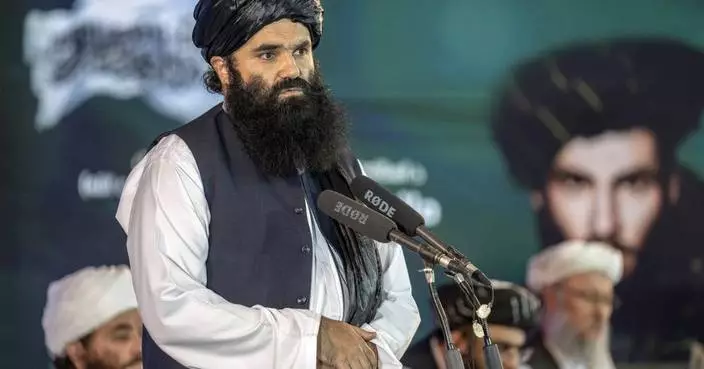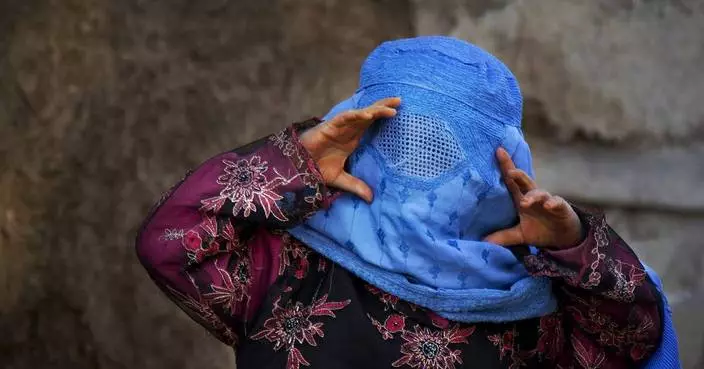N early half of all Afghans want U.S. and NATO troops to leave Afghanistan once a peace deal to end the country's 18-year war is signed with the Taliban, according to a survey released Thursday.
The American Institute of War and Peace Studies also found that an overwhelming 80% of Afghans surveyed said a political solution was the only way to bring about an end to fighting, Twenty percent said a military solution was possible.
The survey found that 46% of Afghans want U.S. and NATO troops out of the country once a deal is struck, while 33% would have them stay.
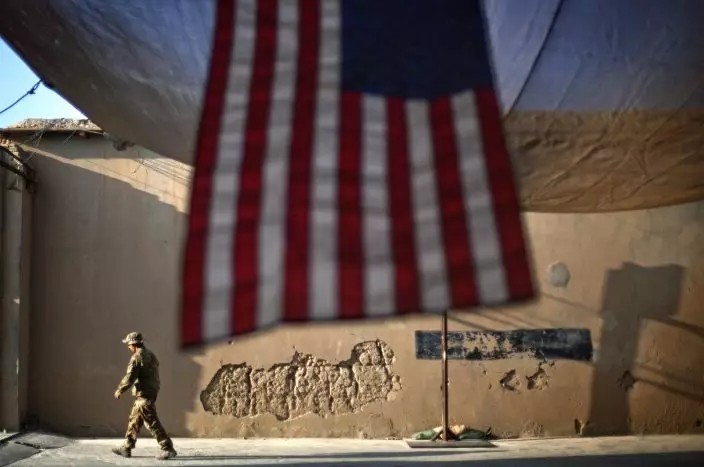
FILE - In this Sept. 11, 2011 file photo, A U.S. Army soldier with the 25th Infantry Division, 3rd Brigade Combat Team, 2nd Battalion 27th Infantry Regiment walks past an American Flag hanging in preparation for a ceremony commemorating the tenth anniversary of the 911 attacks, Sept. 11, 2011 at Forward Operating Base Bostick in Kunar province, Afghanistan. Most Afghans want US and NATO troops to leave Afghanistan once a peace deal to end Afghanistan's 18-year war is signed with the Taliban, according to a survey carried out by the American Institute of War and Peace Studies. The survey conducted in 2019, between Nov. 23 and Dec. 20 has a five percent margin of error. (AP PhotoDavid Goldman, File)
The survey polled 5,038 Afghans in 34 provinces. It was conducted between Nov. 23-Dec. 20 and has a 5% margin of error. Sixty-one percent of participants answered online with the remaining 39% were interviewed in person.
While 57% of those surveyed wanted the Taliban to evict the foreign fighters among them, a surprising 47% of respondents said they should be allowed to remain in the country. Many of those foreigners are believed to have links to al-Qaida and other militant organizations.
Washington has been talking directly with the Taliban since September 2018, when the White House appointed Afghan-American Zalmay Khalilzad to start peace talks. The talks are aimed at finding an agreement to end America's longest conflict and allow the U.S. to bring home its troops.
The survey showed Afghans were divided over the choice of Khalilzad as chief negotiator, with 41% favoring his appointment and 39% opposed. A whopping 20%, however, said they had no opinion.
Of the 5,038 Afghans surveyed, 3,274 were men and just 1,764 were women.
A strong 83% of those surveyed said women should be involved in the peace negotiations, while just 17% were opposed.
A peace agreement, which is being negotiated between Khalilzad and Taliban negotiators, will leave it to Afghans on both sides of the conflict to negotiate the face of a post-war Afghanistan. They must decide on constitutional changes enshrining the rights of women, media and free speech. The negotiations will decide the future of Taliban fighters as well as the heavily armed militias belonging to warlords ruling in Kabul.
The majority of Afghans surveyed said they feared their homeland would descend into civil war if America pulls out its troops without first getting a peace deal.
As Afghans contemplate a future without a U.S. military troop presence, in Iraq the killing earlier this month of Iranian Gen. Qassem Soleimani has bolstered Iran's efforts to see U.S. troops leave Iraq. The withdrawal of American forces from Iraq has been a long-standing goal of Iran's.
Meanwhile, Taliban fighters took responsibility Thursday for the ambush and killing of an Afghan intelligence official in southern Helmand province.
The officer, who headed the intelligence department's press office for the province, was ambushed late Wednesday, according to provincial police chief spokesman Zaman Hamdard.
In the country's north, a roadside bomb killed a military commander and his bodyguard early Wednesday.
The attack in northern Faryab province killed the commandeer of the Afghan army's 1st Battalion and his bodyguard and wounded two other bodyguards.
The Taliban control or hold sway over roughly half of Afghanistan and continue to stage near-daily attacks targeting Afghan and U.S. forces, Kabul government officials or those seen as linked to the government. That's the case even as they hold peace talks with the U.S. and have given the U.S. envoy a document outlining their offer for a temporary cease-fire in Afghanistan.
Associated Press writer Kathy Gannon in Islamabad contributed to this report
WASHINGTON (AP) — Lawyers for an American believed to be held by the Taliban for nearly two years are asking a United Nations human rights investigator to intervene, citing what they say is cruel and inhumane treatment.
Ryan Corbett was abducted Aug. 10, 2022, after returning to Afghanistan, where he and his family had been living at the time of the collapse of the U.S.-based government there a year earlier. He arrived on a valid 12-month visa to pay and train staff as part of a business venture he led aimed at promoting Afghanistan's private sector through consulting services and lending.
Corbett has since been shuttled between multiple prisons, though his lawyers say he has not been seen since last December by anyone other than the people with whom he was detained.
In a petition sent Thursday, lawyers for Corbett say that he's been threatened with physical violence and torture and has been malnourished and deprived of medical care. He's been held in solitary confinement, including in a basement cell with almost no sunlight and exercise, and his physical and mental health have significantly deteriorated, the lawyers say.
Corbett has been able to speak with his family by phone five times since his arrest, including last month. His family has not been able to see him — his only visits have been two check-ins from a third-party government — and their characterizations of his mistreatment are based on accounts from recently released prisoners who were with him and his openly dispirited tone in conversations.
“During Mr. Corbett’s most recent call with his wife and children, Mr. Corbett indicated that the mental torture and anguish have caused him to lose all hope,” said the petition, signed by the Corbett family attorneys, Ryan Fayhee and Kate Gibson.
The petition is addressed to Alice Edwards, an independent human rights investigator and the special rapporteur for torture in the Office of the High Commissioner for Human Rights at the U.N. It asks Edwards, who was appointed by the U.N. Human Rights Council, to “urgently reach out to the Taliban to secure Mr. Corbett’s immediate release and freedom from torture, as guaranteed by international law.”
"This situation is just dragging on, and I’m increasingly concerned and taking steps that I hope will make a difference and help the situation — just increasingly concerned and panicking about Ryan’s deteriorating health and physical and mental health," Corbett's wife, Anna, said in an interview. “And that was leading me to take this next step.”
The U.S. government is separately working to get Corbett home and has designated him as wrongfully detained. A State Department spokesman told reporters last month that officials had continually pressed for Corbett's release and were “using every lever we can to try to bring Ryan and these other wrongfully detained Americans home from Afghanistan."
A spokesperson for the Interior Ministry in Afghanistan said this week that it had no knowledge of Corbett's case.
Corbett, of Dansville, New York, first visited Afghanistan in 2006 and relocated there with his family in 2010, supervising several non-governmental organizations.
The family was forced to leave Afghanistan in August 2021 when the Taliban captured Kabul, but he returned the following January so that he could renew his business visa. Given the instability on the ground, the family discussed the trip and “we were all pretty nervous,” Corbett's wife said.
But after that first uneventful trip, he returned to the country in August 2022 to train and pay his staff and resume a business venture that involved consulting services, microfinance lending and evaluating international development projects.
While on a trip to the northern Jawzjan province, Corbett and a Western colleague were confronted by armed members of the Taliban and were taken first to a police station and later to an underground prison.
Anna Corbett said that when she learned her husband had been taken to a police station, she got “really scared” but that he was optimistic the situation would be quickly resolved.
That, however, did not happen, and Anna Corbett, who has three teenage children and makes regular trips to Washington, said she's trying to advocate as forcefully as she can while not letting “anxiety take over.”
“I feel like it’s the uncertainty of all of it that just is so difficult because you just don’t know what’s going to come at you — what call, what news," she said. "And I’m worried about Ryan and the effect of the trauma on him and then also on my kids, just what they’re experiencing. I've tried to protect them the best I could, but this is so difficult.”
Associated Press writer Riazat Butt in Kabul, Afghanistan, contributed to this report.
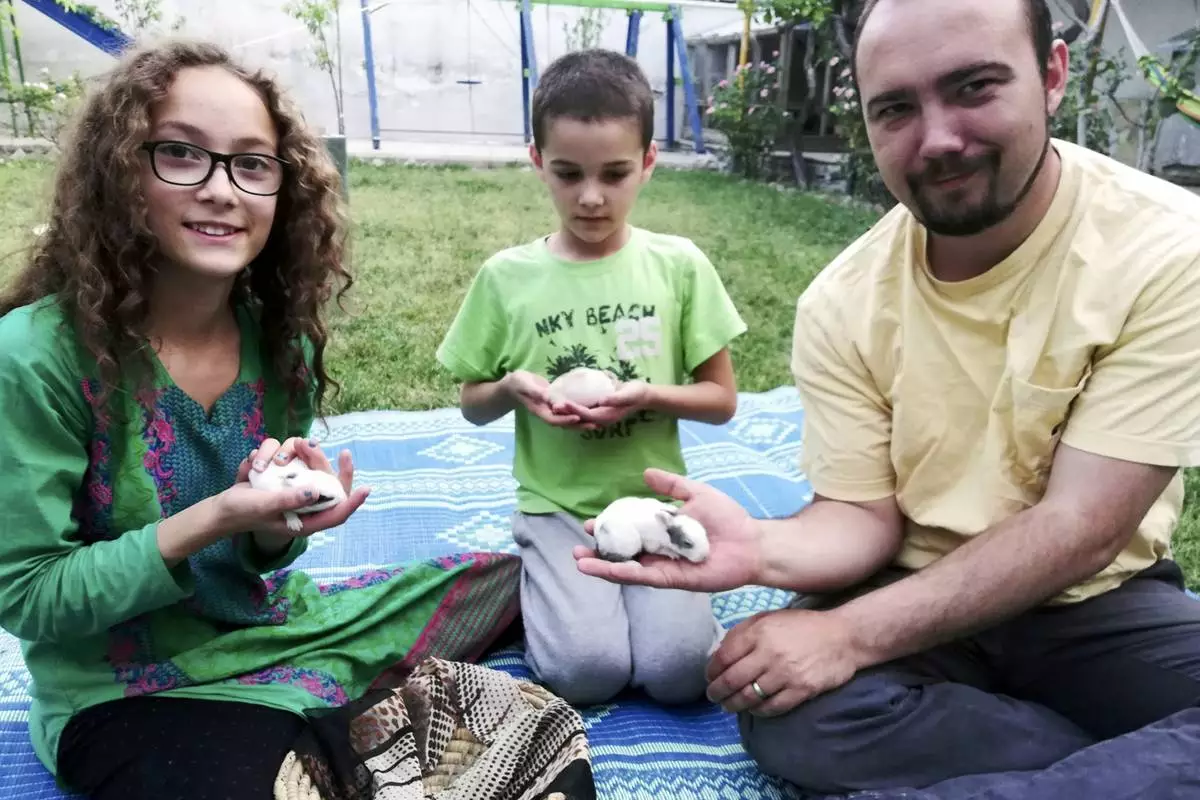
This family photo shows Ryan Corbett holding rabbits with his daughter Miriam and son Caleb in Kabul, Afghanistan in 2020. Lawyers for Corbett, believed held by the Taliban for nearly two years, are asking a United Nations human rights investigator to intervene, citing what they say is cruel and inhumane treatment. Corbett was abducted on August 10, 2022 after returning to Afghanistan, where he and his family had been living at the time of the collapse of the U.S.-based government there one year earlier, on a valid 12-month business visa to pay and train staff. (AP Photo/Anna Corbett)





